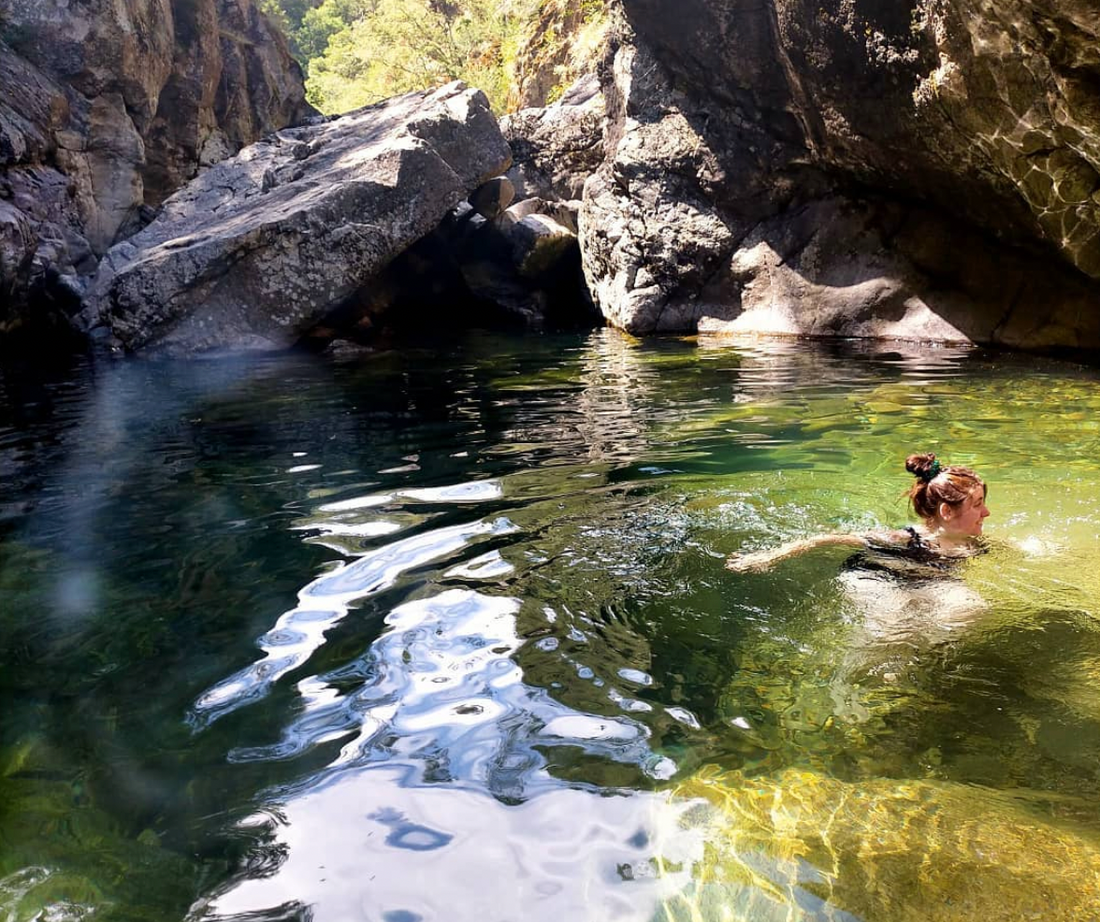By Zoë Amber (@mindfuladventures.australia)
Throughout the last few years, there’s no denying that more and more people have felt a stronger pull towards the great outdoors. These days, spending time in nature seems to be becoming increasingly more desired. Not only are adventures an all round good time, but there are also heaps of mental health benefits from spending time outside.
Ecopsychology blends the fields of ecology and psychology; exploring the relationship between the earth and our mental wellbeing. I have become so passionate about this field of psychology, and would love to share some studies with you on how nature benefits our brain and mental wellbeing.
Did you know that just 20 minutes a day spent in nature can drastically reduce cortisol levels? Cortisol is known as the “stress hormone”, and increases when in tense, anxious situations. Whilst a small amount of stress can be motivating and gently push your limits in a positive way, having too much stress over a long period of time can lead to more extreme and prolonged health problems down the track.
If you are experiencing any level of stress, being in nature may be able to help reduce your symptoms. Consider going for a gentle nature walk, have a picnic in the park, do some meditation, or partake in some nature therapy.
Also, being outside can help lower your blood pressure, muscle tension and heart rate. It’s fascinating to learn how nature can change our bodies on a physiological level.
Neurotransmitters are the chemical messengers in your brain that transport messages around our body! We each have so many different types of neurotransmitters, but I’ll be touching on a few that are impacted by time outdoors.
One such neurotransmitter is serotonin, which has been shown to increase when in nature. Known as the “mood-booster” hormone, boosted serotonin levels can cause increased happiness and wellbeing, and help regulate mood. Breathing fresh air can help boost serotonin, as it’s bringing more oxygen to your brain.
Endorphins also increase when out in nature. These neurotransmitters boost your mood, manage pain, alleviate depression, increase pleasure and reduce stress… How cool! Endorphins increase through exercise, natural lighting and meditation, which of course can all be done outside! Try going for a hike, or run in nature, open your curtains, or do some meditation to feel these benefits.
Finally, dopamine levels can also increase when in nature. Known as the “feel-good hormone”, dopamine is associated with pleasure and joy and is released when our brains expect a reward. The right amount of dopamine can help one feel more alert, happy and motivated! One such activity that has been linked to a gradual dopamine boost is gardening.
Being outdoors helps regulate our melatonin levels and can lead to a better night’s sleep. Melatonin is the hormone associated with sleep, and helps regulate one’s natural sleep cycle (known as our circadian rhythm.)
Naturally, our bodies should have lower levels of melatonin in the morning, and higher levels of melatonin in the evening, as melatonin slowly increases during the day. Being outside during the day helps keep melatonin levels lower so you feel more awake, before the sun goes down and they naturally increase to get you ready for sleep.
However, with the rise of screens, shift work and staying indoors, it’s understandable that some of our natural sleep cycles are out of whack.
Consider spending more time outdoors during the day to help regulate your natural circadian rhythm and feel more tired once the sun goes down.
Isn’t it lovely that nature has been linked to higher rates of positive wellbeing? Not only that, it can help increase your self-esteem.
Humans are social creatures. Being outdoors exposes us to the community and fellow nature-lovers! Something as simple as a “hello” or a smile with a stranger can make you feel less alone and bring a bit more joy to someone’s day.
However, solo adventures in nature have also been linked to increased self-esteem. Witnessing what you are capable of on your own is an empowering experience that is sure to build one’s self-esteem and self-confidence.
Finally, time in nature has been linked to improved concentration, memory and critical thinking. A study showed that after a walk in nature, participants had better results on a memory test than those who went for a walk in urban areas (G. N. Bratman 2015).
Anxiety and depression are serious mental illnesses that cause stress and difficulty in our lives. Whilst nature is not a be all and end all cure, studies have shown that being outdoors can help reduce symptoms associated with mental illness.
One Harvard study showed that after a 90 minute walk in nature, participants had decreased activity in the part of the brain associated with depression. Also, Mind found that participants felt more calm and balanced after being outside, instead of stressed, anxious or depressed.
“Shinrinyoku”, which is the Japanese tradition of forest bathing, is a meditative experience in nature that has been linked to reduced levels of anxiety, depression and anger.
Finally, time in nature can help reduce rumination, which involves dwelling in negative thoughts.
DISCLAIMER: If you live with mental illness, please do what you need to do to look after your mental health. Whilst nature is something that has helped me reduce my own symptoms of depression and anxiety, you are in control of your own treatment. If incorporating time in nature is something you feel will benefit you, consider giving it a go. If you are hesitant, have a chat with a loved one or someone on your support team. They may even be able to link you to a local walking group, give suggestions to start your journey, or even connect you to a support worker who can help you access nature. Good luck, and please take care of yourself.
LIFELINE - 13 11 14
Feeling connected to something bigger than yourself
Time in nature can increase feelings of awe, which is defined as "that sense of wonder we feel in the presence of something that transcends what we already know." I've been absolutely speechless by mountains and waterfalls that have transfixed me with their grandness and beauty.
Adventures can be a humbling experience; you realise that you are so small in the grand scheme of things. So much has happened throughout time and place; just think of all the history that has occurred on country. Indigenous people have been on this land for 65,000 years; it's mind-blowing and humbling to think how much has occurred throughout history.
Nature can also inspire us to create change. Going out on hikes, I often read signs to learn about issues in the area. Campaigns and blogs online can educate us on some of the hardships certain groups of people or areas face. This may inspire you to volunteer your time, donate some money or spread awareness for a certain campaign. Nothing changes if nothing changes; if you witness something that makes you feel something, do some research and see what you can do to help.
Nature can increase feelings of gratefulness and life satisfaction. Getting outside and experiencing all the wonderful things life has to offer can help you remember how good life can be. Through my experiences hiking in multiple countries, exploring Australia in depth, and trying new experiences, I feel grateful to be alive and excited for what the future has in store.
This is just a small snippet on some of the ways that nature can benefit your mental health and wellbeing.
Something as small as a walk outdoors, engaging in some nature therapy, or meditation in nature can help you reap these benefits.
For more ecopsychology and nature therapy, check out @mindfuladventures.australia

